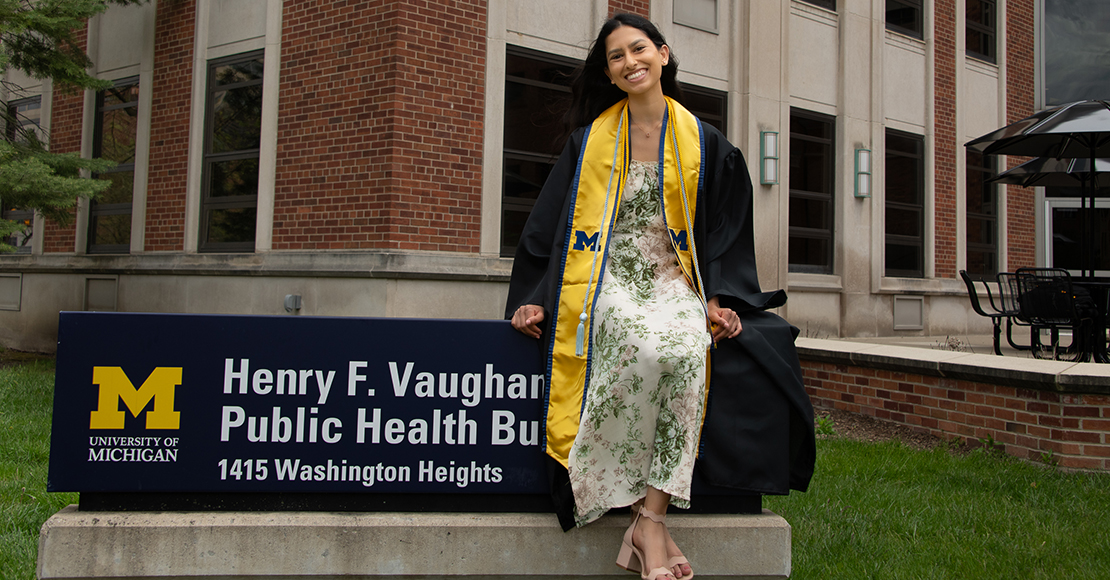Connecting healthcare systems and individual experiences

Aparna Reddy, BA ’24
Community and Global Public Health
Aparna Reddy, BA ’24, is dedicated to health equity and sustainable healthcare.
Reddy’s passion for medicine and public health was influenced by her cultural heritage and personal experiences, leading her to the University of Michigan.
Reddy’s family roots played a pivotal role in shaping her understanding of health disparities.
“My parents are immigrants from India, and I've visited under-resourced areas there,” said Reddy, who was born and raised in Southeast Michigan and calls West Bloomfield home. “Seeing the lack of access to care first hand made me interested in health equity.”
Her drive to improve healthcare is further fueled by personal tragedy.
My parents are immigrants from India, and I've visited under-resourced areas there. Seeing the lack of access to care first hand made me interested in health equity.”
“My grandpa passed away due to a medical error in India,” Reddy said. “It was a preventable mistake caused by a lack of communication regarding test results.”
This incident underscored the importance of systemic improvements in healthcare, inspiring her to pursue a field where she could make a difference.
Reddy knew from an early age where she would go to college.
“I’ve always been a big fan of Michigan,” she said.

However, her path to public health was not immediate. It was her involvement in Blueprints for Pangea, a nonprofit student organization, that introduced her to the field.
“Blueprints for Pangea reallocates excess medical supplies to areas in need,” Reddy said. “Hospitals often have supplies that go unused and end up in landfills. Our goal was to reduce medical waste and improve equity by redistributing these supplies.”
This experience, coupled with her growing interest in systemic healthcare solutions, led Reddy to apply to the School of Public Health during her sophomore year.
“Blueprints for Pangea exposed me to the concepts of public health, and through that I learned about the fact that there was a major and a school dedicated to it,” she said.
Reddy earned a Bachelor of Arts in Community and Global Public Health at Michigan Public Health, immersing herself in courses that emphasized health equity, social determinants of health and community-focused research.
“Learning about health equity and the social determinants of health was foundational,” she said.
Her coursework provided a nuanced understanding of how healthcare systems can be improved both locally and globally.
One of Reddy’s significant involvements was with the Center for Healthcare Engineering and Patient Safety, where she worked on a project focused on resource allocation for lung cancer screening programs.
“We looked at how to implement these programs sustainably and ensure they reached the right demographics,” said Reddy, who was recognized in 2023 with the Commitment to Service Honorable Mention at the Public Health Honors awards.
Public health helped me see the connection between healthcare systems and individual experiences.”
This interdisciplinary approach, combining engineering, public health and medicine, embodied her commitment to systemic solutions.
Reddy’s undergraduate experiences solidified her belief in the importance of integrating systems-level thinking with individual patient care.
“Public health helped me see the connection between healthcare systems and individual experiences,” she said.
This realization guided her toward a career in medicine, where she could bridge these two perspectives. She entered the Stanford University School of Medicine in the fall of 2024.
In addition to her academic pursuits, Reddy found mentorship and support among the faculty at Michigan Public Health.
She highlighted Emily Youatt, director of Undergraduate Education and clinical associate professor of Health Behavior & Health Equity, who taught the introductory public health class and later became a mentor.
“Dr. Youatt was incredible,” Reddy said. “She provided guidance not only in my coursework but also in navigating the medical school application process.”
Outside of her academic commitments, Reddy was deeply involved in activities that complemented her public health education. She served as a representative for the Center for Interprofessional Education, which fosters collaboration across different health disciplines at the University of Michigan.
“Healthcare is so interprofessional and interdisciplinary,” Reddy said. “Building those skills early on was really valuable.”
Reddy’s dedication to her community extended to her role in Blueprints for Pangea, which she participated in throughout her undergraduate years. Under her leadership, she said the organization successfully reallocated approximately $4 million worth of medical supplies, benefiting both local and international communities.
Finding balance amid her rigorous academic schedule, Reddy turned to a passion rooted in her cultural heritage: dance.
“I started learning Bharatanatyam, a type of Indian classical dance, during my senior year at Michigan,” she said.
This artistic pursuit not only provided physical exercise but also a means to relieve stress and stay connected to her cultural roots.
Reddy’s transition from Michigan Public Health to the Stanford University School of Medicine has been seamless, thanks in large part to her public health background.
Participating in the Leadership in Health Disparities Program at Stanford the summer before starting medical school, she built on the foundation laid during her undergraduate studies.
I want to explore ways to make healthcare more efficient and equitable both for the patients I see and those I may never meet.”
“Public health taught me the importance of maintaining a health equity lens,” she said. “It’s crucial to remember why we pursue medicine in the first place.”
As she progresses through medical school, Reddy remains focused on sustainability within healthcare.
“There is so much waste in the operating room,” she said.
Reddy is passionate about reducing medical waste and its impact on under-resourced communities, an issue she first tackled with Blueprints for Pangea.
“Waste disposal often worsens the health of communities near disposal sites, creating a vicious cycle,” she said.
Looking ahead, Reddy aspires to address these inefficiencies as a physician. She aims to implement sustainable practices and advocate for systemic changes that enhance healthcare delivery.
“I want to explore ways to make healthcare more efficient and equitable,” she said, “both for the patients I see and those I may never meet.”
